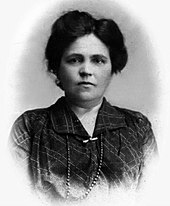Rosstriljane widrodzhennja
Rosstriljane widrodschennja ( Ukrainian Розстріляне відродження ) describes the executed rebirth . In the 1930s, Ukrainian writers, publicists, and artists of the Ukrainian cultural renaissance of the 1920s were imprisoned and executed. Others perished in the gulags .
The 1920s
In the Polish-Soviet war after World War I , western Ukraine, annexed by Poland, was split off and quickly Polonized .
The literature in central and eastern Ukraine, on the other hand, was shaped by the Soviet Union , its opportunities - for example through the literacy campaigns - and restrictions. Here, since 1923, the Ukrainian language has been promoted again as part of the Korenisazija policy ( Ukrainization ). A literary public arose; many authors based themselves on Western European models, such as Dmytro Sahul on symbolism . Mykola Kulisch emerged as a playwright. The Expressionist Theater Berezil was founded and was considered the best theater in Ukraine, Les Kurbas was the director.
Literary organizations


The writers were mostly grouped into literary organizations with different styles or positions. The subjects of discussion were the Ukrainian contribution to Soviet literature and the role of the writer in society. Mykola Chwylowyj and his colleagues supported an orientation towards Western European culture instead of Russian and they rejected “red graphomania”, although they did not reject communism as a political ideology. Chwylowyj became the co-founder and head of the literary group "WAPLITE". Before that he was a member of “Hart”, then one of their critics and for a short time he was also with “Pluh”. His pamphlets provoked the well-known “literary discussion” in Ukraine from 1925 to 1928. In 1928 he founded the magazine Literaturnyj Jarmarok in Kharkiv .
The most important literary organizations of the time were:
- Hart (Ukrainian: Гарт, to harden ) 1923-25.
- VAPLITE (ВАПЛІТЕ, short for Free Academy for Proletarian Literature ) founded in 1926.
- MARS (МАРС, Revolutionary Literature Workshop ) 1924–29.
- Aspanfut (Аспанфут), later Komunkult (Комункульт) an organization of the futurists.
- Neoclassicists (Неокласики).
- Pluh (Плуг, plow ).
Executions
During the Great Terror , many artists and intellectuals were arrested and charged with Ukrainian nationalism and espionage or terrorist activities. On October 27, 1937 and November 3, 1937, many of them were shot dead in mass executions commemorating the twentieth anniversary of the October Revolution in Kiev. Stalin had ordered the execution of 1,111 artists. On November 3, 290 members of the Ukrainian intelligentsia were shot dead in Sandarmoch , Karel . Most of them only have symbolic tombs.
Around 300 writers fell victim to Stalin's persecution. The Ukrainian Writers' Union was liquidated in favor of the All-Soviet Union. A number of authors from Ukraine went into exile.
Representative of the Rosstriljane widrodzhennja
- Mychajlo Bojtschuk ( Миха́йло Льво́вич Бойчу́к , 1882–1937, artist and painter; executed)
- Kost Burewij ( Кость Степанович Буревій , 1888–1934), writer; executed)
- Mykola Chwylowyj ( Микола Хвильовий , 1893–1933; suicide)
- Mychajlo Draj-Chmara ( Михайло Опанасович Драй-Хмара , 1889–1939, poet, translator and linguist; death in the Gulag)
- Hryhorij Epik ( Епік Григорій Данилович , 1901–1937, writer, journalist and translator; executed)
- Pavlo Fylypowytsch ( Павло Петрович Филипович , 1891-1937, writer, literary critic and translator; executed)
- Mychailo Jalowyj ( Михайло Омелянович Яловий , 1895–1937, poet, playwright, author; executed)
- Majk Johansen ( Майк Гервасійович Йогансен , 1895–1937, poet, playwright, critic, linguist; executed)
- Hryhorij Kossynka ( Григорій Михайлович Косинка , 1899–1934, publicist, translator and writer; executed)
- Ivan Kruschelnyzkyj ( Іван Антонович Крушельницький , 1905–1934, poet, playwright, graphic and literary critic; suicide after imposed death penalty)
- Mykola Kulisch ( (Микола Гурович Куліш , 1892–1937, author, playwright, educator; executed)
- Oleksandr-Zenon Kurbas ( Олександр-Зенон Степанович Курбас , 1887–1937, director; executed)
- Sofija Nalepynska ( Софія Олександрівна Налепинська , 1884–1937, artist; executed)
- Valerjan Pidmohylnyj ( Валер'ян Петро́вич Підмоги́льний , 1901–1937, executed)
- Luciana Piontek ( Люціа́на Ка́рлівна Піо́нтек , (1899–1937) author, poet; executed)
- Jewhen Pluschnyk ( Євген Павлович Плужник , 1898–1936, poet; death in the Gulag)
- Klym Polishchuk ( Клим Лаврентійович Поліщук , 1891–1937, poet, author; executed)
- Valeryan Polishchuk ( КВалерян Львович Поліщук , 1897–1937, author, literary critic-theorist; executed)
- Dmytro Sahul ( Дмитро Юрійович Загул , 1890–1944, poet; death in the Gulag)
- Mychajlo Semenko ( Миха́йло Васи́льович Семе́нко , 1892–1937, writer; executed)
- Mykola Serow ( Микола Костянтинович Зеров , 1890–1937, classical philologist, translator and poet; executed)
- Ljudmyla Staryzka-Tschernjachiwska ( Людми́ла Миха́йлівна Стари́цька-Черняхі́вська , 1868–1941, author, translator, died on deportation )
- Oksana Steschenko ( Окса́на Миха́йлівна Стеше́нко , 1875–1942, author, translator, teacher, died in the Gulag )
- Wolodymyr Swidsinskyj ( Володи́мир Євти́мович Свідзі́нський , 1885–1941, poet, translator; murdered)
- Weronika Tschernjachiwska ( Вероні́ка Олекса́ндрівна Черняхі́вська , 1900–1938, poet, translator; executed)
- Marko Woronyj (1904–1937, poet, translator; executed)
The three first chairmen of the Writers' Union were:
- 1934–1934 Iwan Kulyk ( Іван Юліанович Кулик , 1897–1937)
- 1934–1936 Anton Sentschenko ( Антон Григорович Сенченко , 1898–1937)
- 1936–1937 Ivan Mykytenko ( Іван Кіндратович Микитенко , 1897–1937)
literature
- Dimitrij Tschižewskij, Anna-Halja Horbatsch: The Ukrainian literature. In: Kindler's new literary lexicon. Vol. 20. Munich 1996, pp. 393-399.
- Irene Rima Makaryk: Shakespeare in the undiscovered bourn. Les Kurbas, Ukrainian modernism, and early Soviet cultural politics. University of Toronto Press, Toronto Buffalo 2004, ISBN 0-8020-8849-X (English).
Individual evidence
- ↑ Article on Khvylovy, Mykola in the Internet Encyclopedia of Ukraine (Canadian Institute of Ukrainian Studies / University of Toronto; English); accessed on September 3, 2016
